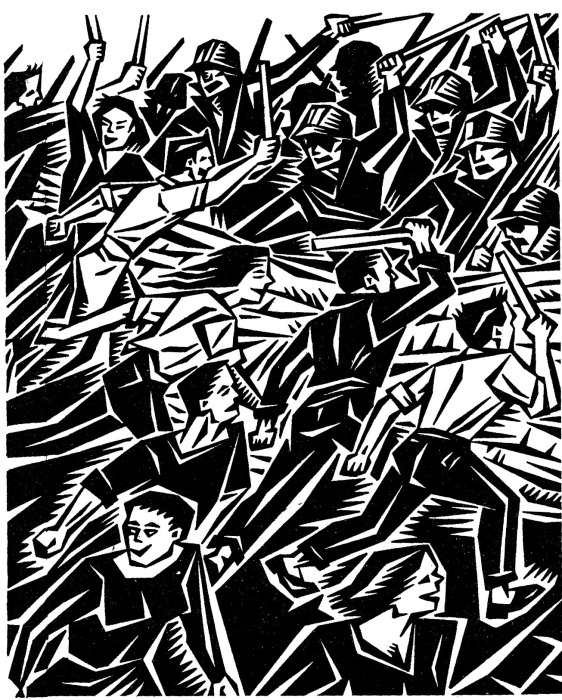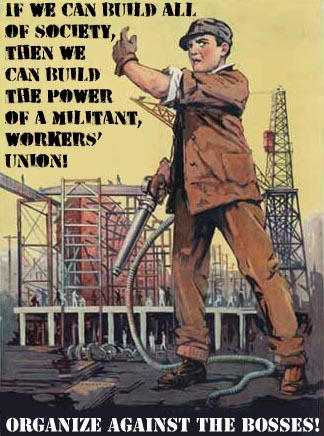|
|||||||||||||
|
of Organized Workers? By Punkerslut
Everywhere in society, there is a dependence on the workers. From those who sweep the floors to those who design airplanes, there is a need for labor. For manual labor and skilled labor, for mind and responsibility, seasonal and continuous, everywhere, labor is required. It could be a farm or a factory, it could be an office building or a tavern -- labor is needed by those who own the land to make them a profit. Without us, they would not be able to build up their wealth, and to make a living simply by owning property. The possessors, those who dominate and control congresses and senators, are all reliant upon the workers to provide their wealth. There is always unemployment, though, so the competition between workers is never too strong. They can always find someone else, if you're demanding too much for your wage. That thought must always be in your mind when negotiating for your pay -- for the standard of living you'll be allowed to have. Even though everything in society depends on us, we are in the position of one who is dominated, controlled, and mastered. We are an exploited class. Whether we can work, the conditions of our labor, and how much we are allowed from what we make -- all of these are decisions that are completely out of our hands. In an economic sense, we are the servile, disregarded class, the many who are under the rule of the few. Those who possess the factories, the mines, and the farms also have the politicians in their pocket. They flood congress with interest groups and they pour gallons of money into campaign boxes. When they are rejected, they use their ownership of the press to demolish the image of any congressman.
Laws that protect the oceans and the atmosphere are weakened, because it serves the interests of big oil and industrial companies. Laws that fight discrimination are marginalized and poorly enforced, because they can only be enforced against a possessor of property. And wars that get weapons contracts for the industrialists and land for the developers -- they are supported wholeheartedly, and with the full fanfare of patriotic rhetoric. Police are used to beat down strikers, picketers, and demonstrators where there are murders left unsolved and uninvestigated. The state has been nothing more than a tool, dominated by the wealthy, and weakly influenced by the common people. Those who only hate these evils of the state will talk about civil disobedience and protesting. They'll talk about education as the means of resolving the social evil -- to destroy a social ill, one must only drag it into the public spotlight, and then the people will naturally reject it. This has been the tactic of those who are appalled only at the state, but not at the cause of the state's oppression. If we look at why governments have oppressed people, it is always because there is a small, privileged minority that stands to benefit from it. Whether it is the protection of the nobility, the aristocracy, the bureaucracy, the one-party system, the upper caste, the priestly class, or the capitalist class, the state bends at the will of wealth and property. It seems so natural, then, that if the state is empowered to do oppress its people by a small class, we must not just resist the state. We must direct our resistance against the privileged class itself! The state cannot wage a war without guns, tanks, airplanes, and ships. It cannot control its people without an endless army of obedient police that follow orders. It cannot build prisons without bricks and bricklayers, it cannot develop biological weapons without labs and scientists. In order to guarantee the power of the state, it must rely on the wealth of a privileged, wealthy class. And in exchange for the produce made out of economic slaves, the state serves the interests of the wealthy. Government oppression is only possible when the state is fully-funded and backed by enough troops; it can only occur where resistance has no chance against organized empires, where rebellions are small and terrify the population. It is only with the aid of those who own the iron mines and the factories that turn steel into tanks.
The act of protest is weak, because it is only to make a demand, to petition for an address of grievances from your master. Demonstrations have done unbelievable things for certain social movements, but there are so many that just result in the beating back of the people. When holding up a sign that reads what you want to see changed, it is up to the government to decide to accept it. If the Capitalist class relies on our labor to exist, then the strongest tactic would be for all workers to withdraw their labor at the same time. Not just a union strike of one business or industry, but a General Strike of the entire working class. This is the most direct and effective way of resisting tyranny. As there is no war without those who provide war-supplies, there is no oppression without those who provide the police departments and jails. The withdrawing of labor, and the shutting down of the entire economy, can effectively starve out the wealthy, and force them to submit to our demands. It can be a General Strike to end a war, to protect nature preserves, to improve wages, to make jobs, or to stop the violent persecution of a cultural or racial minority. It is not simply just a protest against government, but it withdraws all power from those who give the government power. By the means of this tool, we can force the state and the capitalist class to change the world according to our demands. It has worked in Ancient Rome, when the plebeian class went on a General Strike called the Secessio Plebis. It worked in India to abolish British rule, in Russia to abolish the Tzar's rule, and in Syria to abolish French rule. In all of these cases, the state was nothing more but a justification for the exploitation and real slavery of the people. It could not enforce laws without payments from the class of slavers -- without the materials made by those who are oppressed. It has succeeded in the past, going back thousands of years, and it has succeeded in our own time.
For those who genuinely seek to change society, to eradicate tyranny and economic privilege, they must look to what has worked. They must examine what has advanced progress, what has created liberty, and what has brought about peace and social harmony. In doing so, they find the General Strike to be the most efficient and strongest of tools. It requires organization, though. There are a few Capitalists, so it is not hard for them to cram into a single hotel and plan the lives of everyone else in society. There are many workers, of all trades, of all national and ethnic backgrounds, of all languages and cultures. To bring us together, who are poor and dispersed and downtrodden, requires tremendous energy. It can only be done where it only seeks to improve all workers -- where everyone who contributes to the Strike benefits by it, where all people of the social movement are advanced because of their participation. The Industrial Workers of the World, an Anarcho-Syndicalist trade union federation, has adopted the perfect slogan to this extent: "An injury to one is an injury to all." The one, big union of all workers can only function where it serves the end of all workers -- it cannot make itself an organ of politics, a church that mandates opinions, or dominates by a leadership. It must only ask for the voluntary, cooperation of the workers to help each other in achieving economic emancipation. It must only work in the direction of improving the lives of all -- by hitting the cause of the suffering that effects the people, the Capitalist system and the State.
Punkerslut,
|




